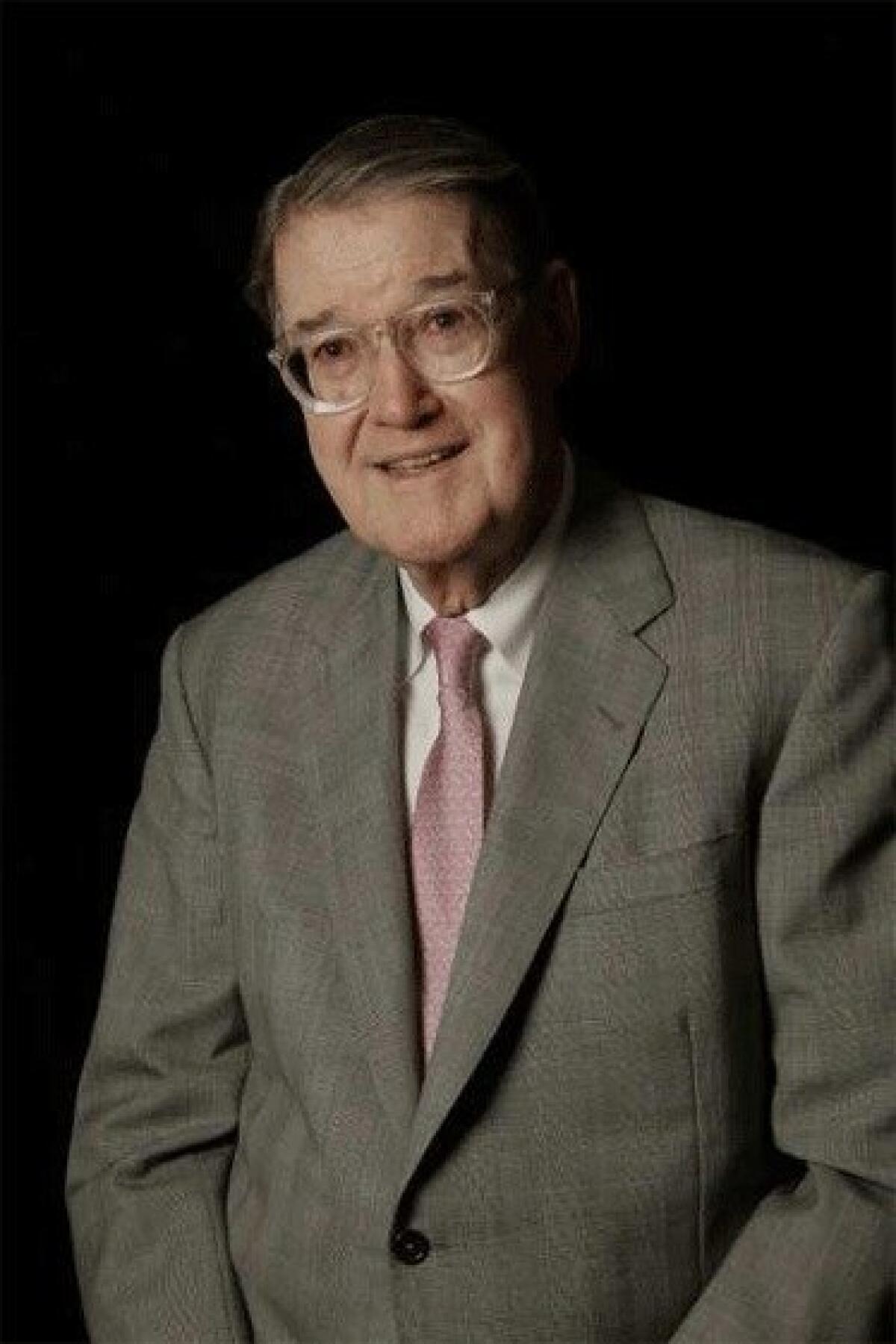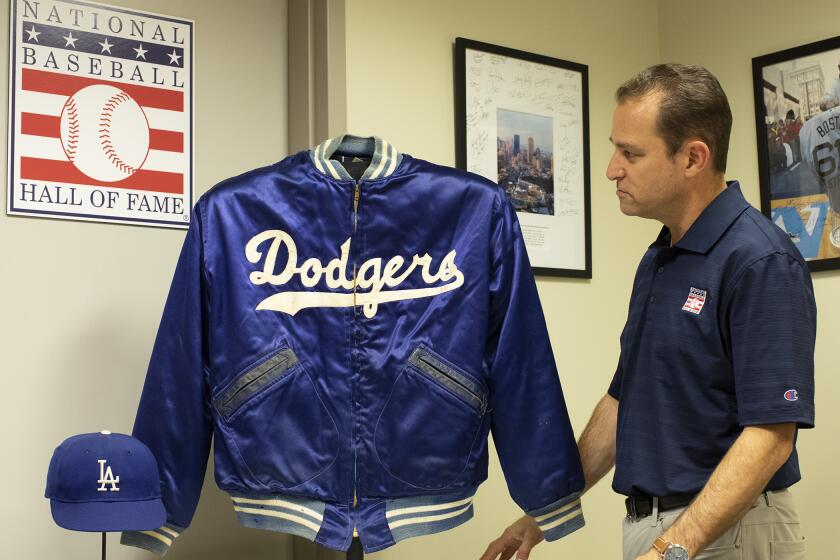Patt Morrison Asks: Blue blood, Peter O’Malley

- Share via
In 1938, after voters recalled L.A.’s crooked mayor, Frank Shaw, it’s said that someone planted a sign on the City Hall lawn: “Under new management.” The new ownership of the Dodgers needs no sign. The purchase, by a Chicago financial service company at a record price, has been heralded in every way but skywriting.
Many people made a run at buying the Dodgers. One of them was Peter O’Malley, who got his own record price for the ball club 14 years ago. Son of Walter O’Malley, who brought the team from Brooklyn to L.A., Peter wanted back in the game, but like so many others, was outbid. Now, after the “unpleasantness” of the last few years, he says he’s confident in the new ownership. On Tuesday he’ll be in the stands for the first home game of the season like thousands of other Angelenos, proof that baseball fans are the very definition of spring’s eternal hope.
You must have great lifetime seats.
When we sold the ball club, Fox offered us the box for a long time. I said no thank you. I want to come when I come, but to have that box empty when our family’s not there wouldn’t look right. I go and sit in different places, on the field level or the loge or the dugout seats or the reserved deck up top; it’s all a good view. I was there every night except for these last few years. It was difficult in recent years, it really was. The people who have worked there a long time were saying how much they missed us and everything, and I didn’t think that was good for them to say or for me to hear.
Opening day sold out incredibly fast — was that a vote of confidence for the new ownership?
Opening day has traditionally been a sellout. Years ago when we moved it from a night game to a day game, people thought, that’s going to be tough, but now it’s a traditional date on people’s calendars and it should always be a sellout.
What about the Chicago element of the new ownership?
I know a lot about Stan Kasten — first-class baseball executive. I’ve talked to Stan. I’m very optimistic.
Our family really wanted to be sure that the Dodgers were in the right hands. That doesn’t necessarily mean our hands, but we wanted the right hands. I think the new owners will do an excellent job. Magic [Johnson, one of the winning bidders] will not disappoint the fans.
Is Kasten going to move here?
Oh, sure, yes, he’ll live here.
Is it odd to have owners who are not from L.A.?
I was hoping quite frankly that a local group would take control. I thought there was a big advantage for local people who had their reputations at stake rather than somebody from out of town, but that didn’t happen. I will support the new ownership completely and enthusiastically.
When did your group leave the bidding?
If the process was a nine-inning process, we left at about the sixth inning.
The bidding was so secretive that I thought we’d finally see white smoke coming from Dodger Stadium: “We have an owner!”
Those were the ground rules, and I think everybody abided by them.
$2.15 billion — did the new owners pay too much?
We’ll [soon] know!
What went wrong for the McCourts?
They got off to a rough start. Just imagine moving to another city and purchasing and leading one of the most important institutions in the city. It’s a big learning curve, and I think if they had lived here for some length of time prior, they could have avoided a lot of the mistakes. It just seemed that a lot of things they touched didn’t work out right, but I couldn’t tell you what happened exactly.
Do people buttonhole you and want to talk about the team?
People are extremely nice. People have always said things they think you want to hear. We have heard a lot of compliments, and that means a lot. But that’s past, and we’re looking forward.
Has Brooklyn forgiven your father for moving the Dodgers to L.A.?
My dad tried for 10 years to solve the aging of Ebbets Field. In the beginning, he never thought about moving. Why would any sports team owner leave New York? He sincerely tried to keep the Dodgers in Brooklyn, and only when he realized he couldn’t make a go of it did he decide to look elsewhere. [Knowing] that has changed a lot of historians’ views.
Is the era of family ownership in sports over?
I’m not sure if it’s over — it’s changed. Sports have gone corporate. Media is a major influence on ownership, and the values of the franchises today — for families, to own a team takes a pretty big wallet. In some respects, corporations live on, unlike individuals or family heads, and that can be good for stability. Franchises need stability, continuity. My dad and I ran [the Dodgers] for close to 50 years. We had a good run, no regrets.
What about ticket prices?
It’s difficult today to price [tickets] properly. The salaries have the major impact. On the other hand you’ve got revenue from television. The fan is the smartest consumer I know. The fan will pay when the product is worthy of his support and will not pay if the team is not worthy of his support. Management will learn that quickly [through] ticket prices, parking prices, the novelties or the food. The fan doesn’t waste his money.
You mention players salaries — free agency has really changed baseball.
When that first came about, I thought it would be tough for the fans to accept that someone they saw coming up in the minors, starting as a rookie, having three, four, five good years with the team, suddenly leaving — but I was wrong. Now it’s part of the game. Yes, the result has been higher salaries. If the large revenue teams have a significantly higher payroll [than] the smaller revenue teams in smaller markets, that’s out of balance, that’s not good for the game. But that’s why they have a luxury tax on the owners and a payroll tax and everything else. The owners and the commissioner are trying to eliminate as best they can the built-in advantage to a team that can afford a higher payroll and ensure that on opening day, theoretically, everybody’s got a chance to win.
Look at what happened with the 1997 Miami Marlins, the team put together to win a World Series and then immediately dismantled in a “fire sale.” Does that make fans cynical?
That was sad for Miami fans, but that’s really an exception. Most owners are in it for the long haul, doing the right thing.
Do the Dodgers mean more to L.A. than other teams mean to other cities?
Vin Scully and Jaime Jarrin deserve an incredible amount of credit for the longtime loyal fan support. [Then] you have the beauty of Dodger Stadium, the weather, the teams. And the Dodgers [are] one of the most important institutions in the city. However the fans may have disconnected in recent years, that connection will be made again.
How is Vin Scully doing?
He’s great. I talked to him yesterday. He’s had his physical, passed it with flying colors, getting ready for opening day. He’s a prince of a person.
The team has built fans among Latinos and other minority communities.
I think Fernando [Valenzuela, Mexican pitcher] deserves credit for that, just as [Korean pitcher] Chan Ho Park; same is true of [Japanese pitcher Hideo] Nomo.
It’s been just over a year since Brian Stow was attacked. How important is security now?
It has to be one of the very top projects [for] new management. It’s not hard to do. [Under O’Malley ownership] if graffiti occurred during the third inning in the restroom, it was painted out in the fourth inning.
And I think alcohol in stadiums should be controlled — not eliminated, but think about how much you want to serve the fans. If you mix an intense rivalry between two teams, music that’s activating the enthusiasm and alcohol consumption — it’s not a good mix. Ninety-nine percent of people go there for a nice night out; you can’t let that 1% or less influence that experience.
People always wonder whether you think your family should have sold when you did, in 1998, and to whom you did, Rupert Murdoch and News Corp.
There’s a time to buy and a time to sell. We thought it was the right time. No regrets. I thought Fox would be an extraordinary owner. Mr. Murdoch lived here, [former Fox entertainment chairman] Peter Chernin lived here, the main office of Fox was in Los Angeles, Fox was the No. 1 sponsor for baseball. I never thought that in a few years they would conclude they would be better off selling it.
Would you consider any role with the new owners?
I’m not looking for any official position, but I told Stan Kasten if they want my view, I’ll give it to them as candidly as I can. I want the team to be successful. I told them to count me in.
What’s your advice for Magic Johnson?
Have a major presence. Not just the [during] the game — get in the office early, put a lot of time in there, walk the stadium. Hear what the people say.
He’ll hear about traffic or food or ticket prices. He’s got to be in touch with the fans and employees. I think he will be a great link between the fan and the front office.
This interview was edited and excerpted from a longer taped transcript. Interview archive: latimes.com/pattasks.
More to Read
Are you a true-blue fan?
Get our Dodgers Dugout newsletter for insights, news and much more.
You may occasionally receive promotional content from the Los Angeles Times.











